1. Rare Burgers
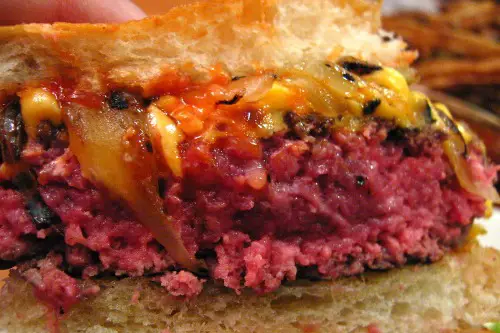
In the U.S., it’s not uncommon to find burgers that are practically mooing, especially at BBQs where flavor is king. Some people swear by a medium-rare patty with a warm, pink center. But in countries like Canada and parts of Europe, serving undercooked ground beef is illegal due to health risks from E. coli. Their food safety rules demand all ground meat be cooked to at least 160°F.
The issue is that harmful bacteria live on the surface of meat, and grinding it spreads those microbes throughout. Cooking a steak rare? Totally fine. But with ground beef, there’s a higher risk unless it’s thoroughly cooked. That’s why rare burgers can land you in legal trouble overseas.
2. Raw Milk Cheese
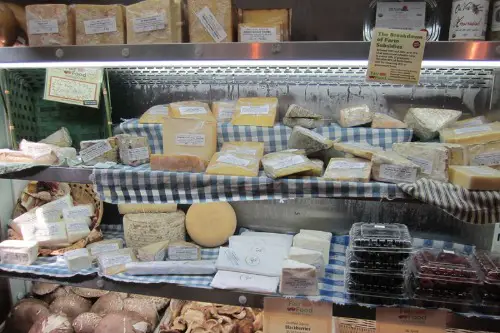
At a backyard BBQ, you might see a cheese board with raw milk cheddar or blue cheese. Americans love a funky wedge or two with smoked meats. But in countries like Australia, selling unpasteurized dairy products is largely banned. The risk of listeria and other foodborne pathogens makes raw milk cheese a no-go.
Some places require that cheeses be aged at least 60 days to reduce bacteria. The U.S. allows certain raw milk cheeses under those guidelines, but others go much stricter. So that creamy, fresh wedge of brie might not fly elsewhere. At a BBQ abroad, you’d better stick with the pasteurized stuff.
3. Foie Gras
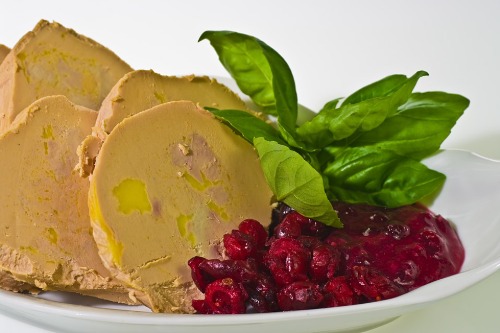
This fancy appetizer occasionally shows up at upscale American BBQs, especially in foodie circles. It’s rich, indulgent, and often grilled or smoked for added flavor. But in places like the UK, India, and parts of the U.S. like California (on and off), foie gras is banned. The reason? Animal cruelty concerns.
Foie gras is made by force-feeding ducks or geese to fatten their livers. The practice is called “gavage,” and it’s considered inhumane by many animal rights groups. Some countries have outlawed both its production and sale. So if you’re slathering foie gras on crostini at a BBQ, you better check local laws first.
4. Cherry Pit Desserts
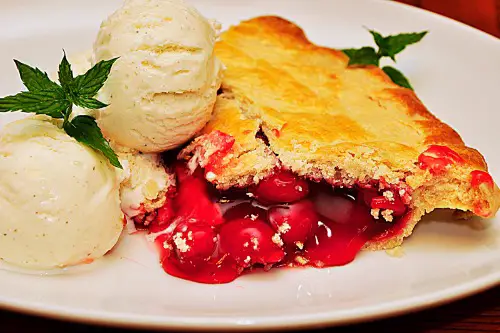
At many BBQs, you’ll see cherry pies or bowls of fresh cherries out for dessert. But watch out—some people love to cook cherries whole, pits and all, for flavor. In countries like the UK, serving foods with hidden inedible objects (like cherry pits in baked goods) can be considered a violation of food safety laws. The danger lies in the risk of choking or breaking a tooth.
Also, cherry pits contain amygdalin, which can convert to cyanide when crushed or chewed. While a few pits won’t harm an adult, high exposure is a legitimate concern. In the U.S., people largely shrug it off. But other countries regulate it more tightly to avoid accidental poisoning.
5. Whole Roasted Pig

The whole hog roast is a centerpiece at many Southern BBQs and Hawaiian luaus. It’s a showstopper, often cooked in a pit or rotisserie-style. However, in countries like Saudi Arabia and Iran, serving pork in any form is strictly forbidden due to religious dietary laws. Even possessing it can be a criminal offense.
That means a whole pig at a BBQ would be more than frowned upon—it could lead to legal action. In other nations with high Muslim populations, pork is similarly restricted. The American enthusiasm for pulled pork sandwiches wouldn’t translate well everywhere. What’s a celebration here could be an arrest there.
6. Kool-Aid Pickles
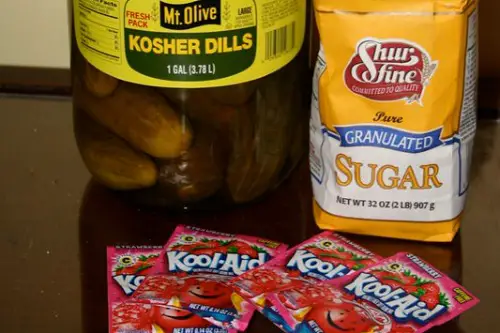
Known as “Koolickles” in the South, these neon-colored pickles soaked in sugary drink mix are a regional BBQ oddity. Kids love them, and they’re often made at home in big jars. But in countries like Norway and Denmark, food colorings such as Red 40—used in Kool-Aid—are either banned or heavily restricted. Authorities there link artificial dyes to behavioral issues in children.
American regulations allow dyes as long as they’re labeled, but the EU and other nations are far stricter. The combination of sugar, dye, and preservatives wouldn’t pass their food safety standards. So this bizarre BBQ side dish might land you in trouble abroad. They may be a Southern classic, but they’d be outlawed in Scandinavia.
7. Corn Dogs
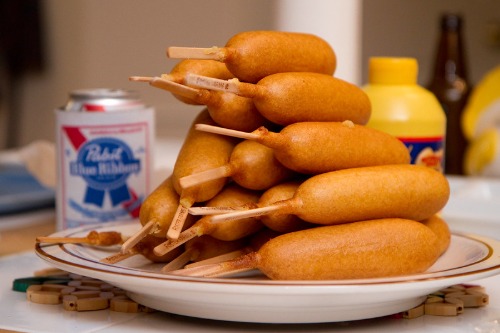
While not strictly BBQ, corn dogs are a common sidekick at backyard parties across the U.S. These deep-fried hot dog-on-a-stick treats are especially popular at fairs and summer gatherings. But in countries like Iceland, trans fats—used in many frying oils—have been banned outright since 2011. Their health authorities say artificial trans fats raise bad cholesterol and contribute to heart disease.
In the U.S., trans fats have been phased out in many places, but enforcement and loopholes vary. Corn dogs cooked with older recipes or cheaper oils could run afoul of international law. Frying up a batch could mean breaking food safety regulations overseas. It’s a guilty pleasure here, but a punishable one elsewhere.
8. Smoked Meats with Liquid Smoke

Liquid smoke is a shortcut often used to flavor BBQ sauces and smoked meats when real smoking isn’t practical. It adds that signature campfire taste without the fire. But in countries like the EU, certain formulations of liquid smoke are restricted due to concerns over carcinogenic compounds like polycyclic aromatic hydrocarbons (PAHs). These chemicals can form during the manufacturing process.
While the U.S. FDA permits it in regulated quantities, European agencies are far more cautious. They’ve limited or banned several brands and ingredients based on toxicity studies. That tangy brisket might taste like summer, but it could raise red flags elsewhere. In some cases, your bottle of liquid smoke could be confiscated at customs.
9. Horse Meat
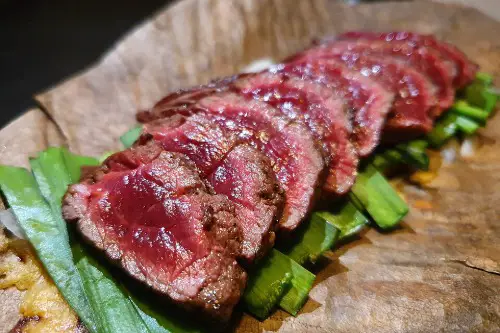
It’s rare, but you’ll find horse meat at some traditional or experimental BBQs, especially among immigrant communities. It’s usually grilled or smoked like beef, and some people say it’s leaner and sweeter. But in the U.S., horse slaughter for food is effectively banned, though not explicitly illegal. Meanwhile, in countries like France, Belgium, and Kazakhstan, horse meat is entirely legal and even traditional.
So the weird twist here is that something banned in America might not be elsewhere. Hosting an international BBQ might mean explaining why this particular protein causes so much controversy. Cultural taboos make horse meat a hard sell at most American events. But in other countries, the shock might be that we don’t eat it.
10. Grilled Frog Legs
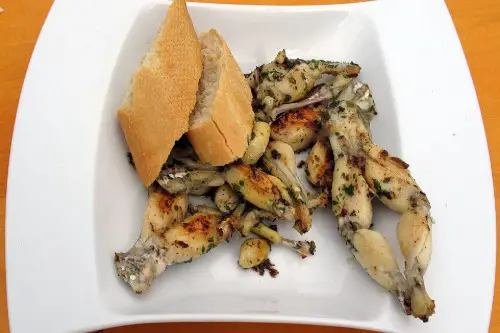
This Southern delicacy shows up at Cajun BBQs and is usually fried or grilled. They’re often compared to chicken and served as an exotic side dish. However, in places like California, harvesting wild frogs is prohibited, and in India, eating frogs at all is illegal under wildlife protection laws. Frogs are seen as vital to the ecosystem, and overharvesting has endangered some species.
The U.S. regulates it more loosely, depending on the state. But in many countries, frogs are protected just like endangered birds or mammals. Serving them at a BBQ might not only break the law but also rile up conservationists. What’s tasty in Louisiana could spark outrage across the ocean.
11. Wild Game Meats
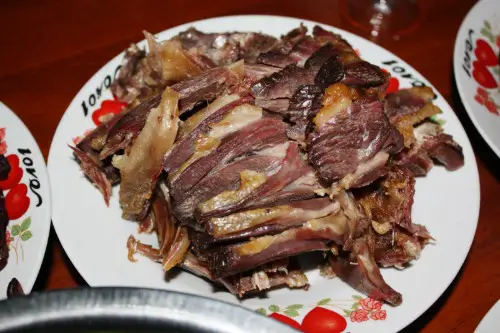
From venison burgers to grilled boar sausages, wild game meats make a rustic addition to any American BBQ. Hunters often bring their own catches to share with friends. But in countries like Japan and the UK, selling or serving uninspected wild game is strictly regulated or banned. The lack of oversight means a higher risk of parasites and disease.
In the U.S., state laws usually govern how game can be served, but informal BBQs often fly under the radar. Elsewhere, the penalties for serving it without proper inspection can be steep. Even gifting game meat can be considered unsafe or illegal. That wild flavor might cost you your grill privileges abroad.
12. Raw Oysters
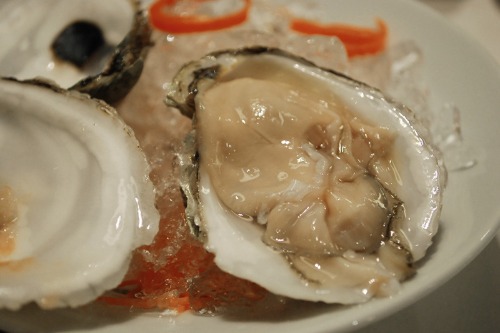
Some coastal BBQs offer raw oysters on the half shell as a fancy starter. They’re often served chilled with lemon, cocktail sauce, or a spicy mignonette. But in countries like Switzerland and parts of Australia, serving raw shellfish without strict temperature and origin controls is forbidden. Oysters are notorious carriers of norovirus and Vibrio bacteria.
The U.S. has its own regulations, but many private BBQs skip the paperwork. Overseas, the margin for error is smaller—oysters must be traceable and tested. Even if they’re fresh, improper handling can make them illegal. That luxurious BBQ treat might be too risky to serve elsewhere.
13. Jell-O Salads
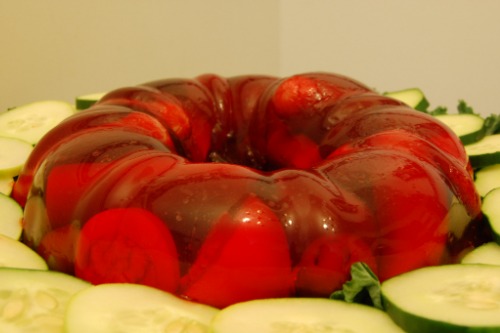
Midwestern BBQs still proudly feature Jell-O salads packed with fruits, marshmallows, and sometimes even shredded vegetables. It’s a quirky, nostalgic dish that confuses outsiders. But in the EU and other countries, food additives like BHT and artificial sweeteners found in some gelatin mixes are banned. These chemicals have been linked to potential hormone disruption and other health risks.
In America, they’re considered generally recognized as safe (GRAS) by the FDA. But overseas, they’ve fallen out of favor or been outright prohibited. What seems harmlessly weird to us might be viewed as toxic across the pond. Your wobbly dessert could wobble you into legal trouble.
14. Fireball Whisky
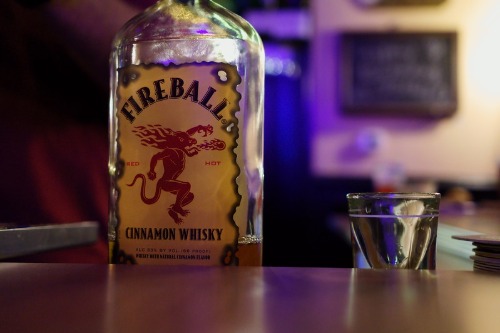
A common backyard BBQ includes drinks, and a popular party staple is Fireball Whisky. Its cinnamon kick and low price make it a hit for shots and cocktails. However, this liquor was briefly pulled from shelves in countries like Norway, Finland, and Sweden due to high levels of propylene glycol. That’s a chemical also used in antifreeze, though in far smaller concentrations here.
In the U.S., it’s still approved for consumption under FDA guidelines. But the European Food Safety Authority set lower limits for this additive, forcing a reformulation abroad. So while you’re tossing back Fireball at a July 4th cookout, just know that drink could be contraband in parts of Europe. Cheers—with caution.
15. Pink Lemonade with Artificial Dyes
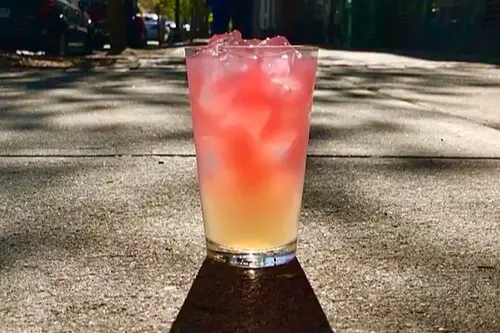
That bottle of shockingly pink lemonade at an American BBQ might seem innocent, but it could be illegal elsewhere. Drinks like this often contain artificial dyes like Red 40 or Yellow 5, which are restricted or banned in countries like Norway and Austria. These dyes have been linked to hyperactivity in children and are heavily scrutinized by European regulators. Meanwhile, in the U.S., they remain widely used with minimal warnings.
In some countries, colorful beverages must be labeled with health disclaimers or replaced entirely by natural coloring alternatives. But in the U.S., that neon hue is just part of the summer vibe. What’s festive here might raise alarm bells abroad. Pouring a glass at a foreign BBQ could get you more than side-eye—it could get you fined.
16. Grilled Spam
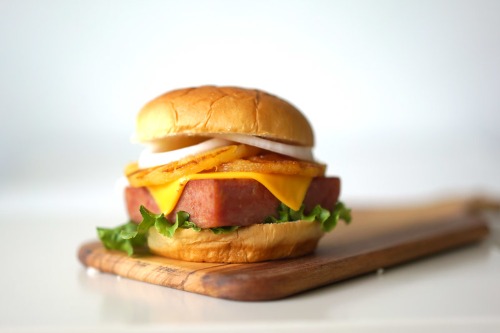
Spam is a backyard BBQ staple in parts of the U.S., especially Hawaii, where it’s often grilled and glazed with teriyaki sauce. Its salty, savory flavor makes it perfect for sandwiches or musubi. But in countries like India and Nigeria, importing or selling pork-based canned meats like Spam is tightly regulated or banned due to religious or cultural dietary laws. Some governments also raise concerns about its high sodium and preservative content.
In places where pork consumption is prohibited for religious reasons, even offering Spam at a gathering could cause serious offense or legal trouble. American BBQs embrace it as retro comfort food, but the rest of the world isn’t always on board. It’s an example of how something mundane can become politically or culturally charged. A Spam slider might be harmless here but forbidden elsewhere.
17. Deep-Fried Twinkies
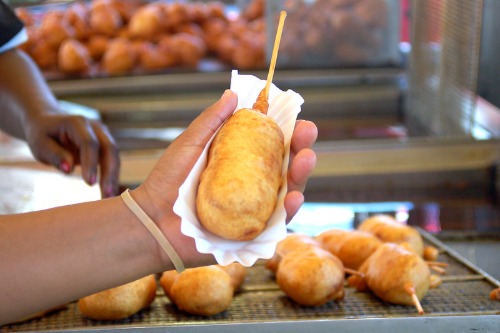
It’s not uncommon to see someone deep-frying desserts like Twinkies at a backyard BBQ, especially during state-fair-style cookouts. The golden, sugary treat becomes even more indulgent when battered and dropped in hot oil. But in countries like Denmark and Switzerland, foods containing high levels of trans fats and artificial additives are strictly regulated. That makes the deep-fried Twinkie a non-starter.
American food laws still allow certain processed desserts that wouldn’t pass muster in Europe or parts of Asia. The combined artificial flavors, preservatives, and unhealthy oils could breach foreign food codes. What’s a crowd-pleaser in the U.S. might be considered a health hazard elsewhere. It’s fun on a paper plate here—but banned by health ministries abroad.
18. Sweet Tea Loaded with HFCS
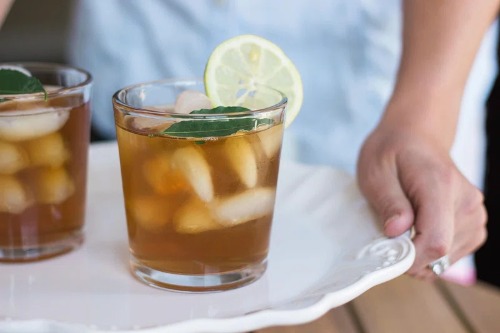
Sweet tea is a Southern BBQ essential, brewed strong and sweetened with heaps of sugar—or more commonly, high fructose corn syrup (HFCS). It’s refreshing, over-the-top sweet, and a cultural tradition. But in countries like the UK and Mexico, products made with HFCS are banned or taxed at higher rates due to health concerns. Many nations prefer cane sugar or natural sweeteners instead.
HFCS has been linked to obesity and metabolic disorders, prompting global pushback. While Americans drink it by the gallon during summer cookouts, it’s disappearing from shelves elsewhere. That jug of sweet tea might trigger import bans or fines if you served it in another country. Abroad, they’d likely insist you brew it differently—or not at all.
19. Hot Dogs with Nitrates

Hot dogs are practically a requirement at American BBQs, usually grilled until blistered and loaded with toppings. But many contain sodium nitrate or nitrite, preservatives used to extend shelf life and maintain that pink color. In countries like Norway and Germany, these additives are banned or tightly restricted due to links with cancer risks. Even hot dog buns may be scrutinized for bleached flour and additives.
While the U.S. allows these substances under FDA guidelines, other countries opt for natural curing methods or outright bans. That makes the American-style hot dog a food safety issue in some places. Kids might be lining up for seconds here, but health inspectors abroad would be appalled. Something so iconic to U.S. cookouts could be straight-up illegal in other parts of the world.
20. Baked Beans with Pork Fat
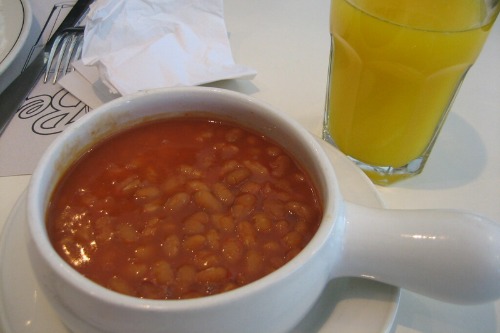
Canned baked beans, especially those cooked with bacon or pork fat, are a BBQ standby in the U.S. They’re sweet, savory, and pair perfectly with grilled meats. But in countries like Israel and many Muslim-majority nations, pork in any form is banned or severely limited by law. Even baked beans containing pork derivatives can be considered unacceptable.
Labeling laws in some regions also require full disclosure of animal origins for imported products. That means your “secret recipe” baked beans could be confiscated at customs or even land you in trouble at a foreign potluck. What’s comfort food in America might be culturally insensitive—or even illegal—elsewhere. It’s a side dish here, but a legal issue abroad.
21. Bacon-Wrapped Anything
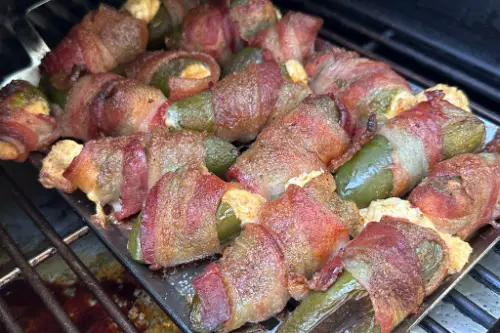
From jalapeño poppers to hot dogs and scallops, bacon-wrapped treats are a hit at American BBQs. The salty, crispy outer layer adds depth to just about anything it touches. But in countries where pork is banned or where food processing laws are stricter—such as Iran, Algeria, or some Indian states—bacon is completely off-limits. Even non-pork alternatives like turkey bacon may be subject to import restrictions.
In some cases, it’s not just about the ingredients but how they’re prepared. Smoked or cured meats often carry additional restrictions due to food safety or religious concerns. That crispy bacon bite you love could break several laws elsewhere. What makes the dish better here could get it banned entirely overseas.
22. Barbecue Sauce with High Fructose Corn Syrup
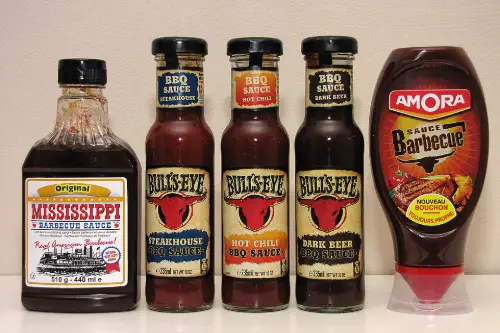
Many commercial barbecue sauces get their sweetness from HFCS, especially the thick, sticky kind served at cookouts. It helps create that caramelized crust on ribs or chicken straight off the grill. However, in countries like France and Chile, HFCS is either banned or taxed heavily due to public health concerns. These countries favor natural sugars and enforce tighter food labeling laws.
That means your favorite bottled sauce might not even make it onto store shelves overseas. And if it does, it could require reformulation or warning labels. A staple in American BBQ flavor profiles, HFCS-rich sauces are under fire abroad. Pouring it on freely here could cause legal headaches elsewhere.
23. Grilled Bologna
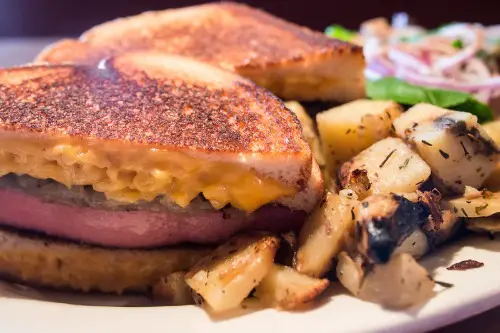
Grilled bologna sandwiches are a nostalgic favorite at many Midwest and Southern BBQs. Thick slices of bologna seared until crispy, then slapped on white bread with mustard, are pure Americana. But in places like Switzerland and Japan, highly processed meats with certain additives, emulsifiers, or colorants can be restricted or banned outright. Some bologna products also contain mechanically separated meat, which raises red flags abroad.
Other countries often require clear labeling of all meat sources and fat content, making U.S. bologna an unlikely import. That quick, easy BBQ snack might not meet local food codes elsewhere. What’s affordable and nostalgic here might be unfit for consumption internationally. The sandwich that feeds the crowd could face regulatory rejection overseas.
24. Miracle Whip-Based Salads
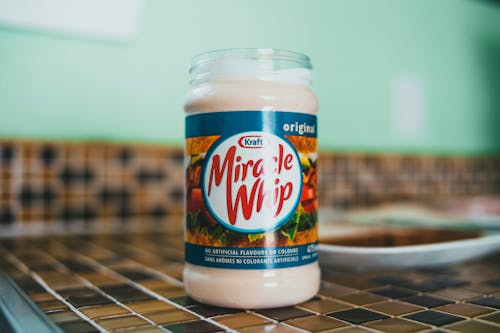
Potato and pasta salads slathered in Miracle Whip are beloved sides at American cookouts. Unlike regular mayo, Miracle Whip contains added sugar, spices, and preservatives—making it sweeter and tangier. But in many EU countries, emulsified condiments with excessive sweeteners and chemical thickeners are not approved for sale. Food additive rules in places like Italy or Sweden are much stricter.
That means your “famous” potato salad might be more suspicious than savory abroad. Miracle Whip’s artificial ingredients could trigger food labeling violations or flat-out bans. What’s creamy and nostalgic here might be viewed as a processed chemical bomb overseas. Bringing it to a foreign BBQ could lead to raised eyebrows—or worse.
25. Caffeinated Alcoholic Drinks
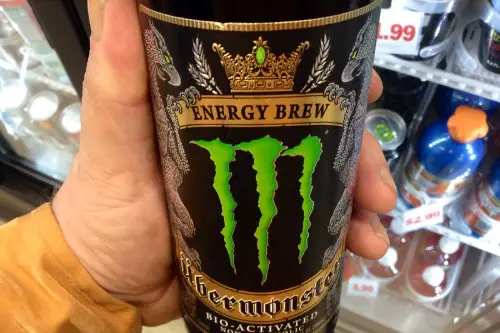
Some American BBQs feature drinks like caffeinated hard seltzers or DIY combos of energy drinks and booze. These caffeinated cocktails are popular at parties, especially among younger crowds. But in countries like Canada and most of the EU, mixing caffeine with alcohol in prepackaged drinks is illegal. Regulators there argue the combo masks signs of intoxication and increases risky behavior.
While brands like Four Loko reformulated to meet U.S. standards, they’re still banned in many other nations. Even homemade versions could be considered illegal if served publicly. The lively buzz from these drinks might come with legal hangovers abroad. At international BBQs, it’s better to keep your Red Bull and rum separate.
26. BBQ Rubs Containing MSG
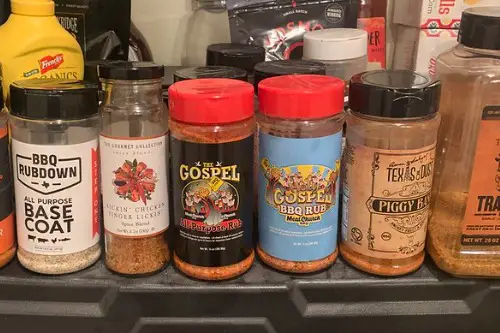
Many American BBQ spice rubs include monosodium glutamate (MSG) for a flavor boost. It enhances umami and makes grilled meats taste even more savory. But in countries like Peru and Thailand, MSG has been banned or restricted in some food categories due to health concerns or public skepticism. Even where it’s legal, labeling laws often require prominent warnings.
In the U.S., MSG is considered safe and widely used in both packaged foods and homemade recipes. But seasoning your ribs with it could land you in hot water abroad—especially if you don’t declare it. While American cooks embrace its flavor-enhancing magic, other countries view it as a potential health risk. That tasty rub might be deemed toxic somewhere else.
This post 14 Things Served at American BBQs That Would Be Illegal in Other Countries was first published on American Charm.


